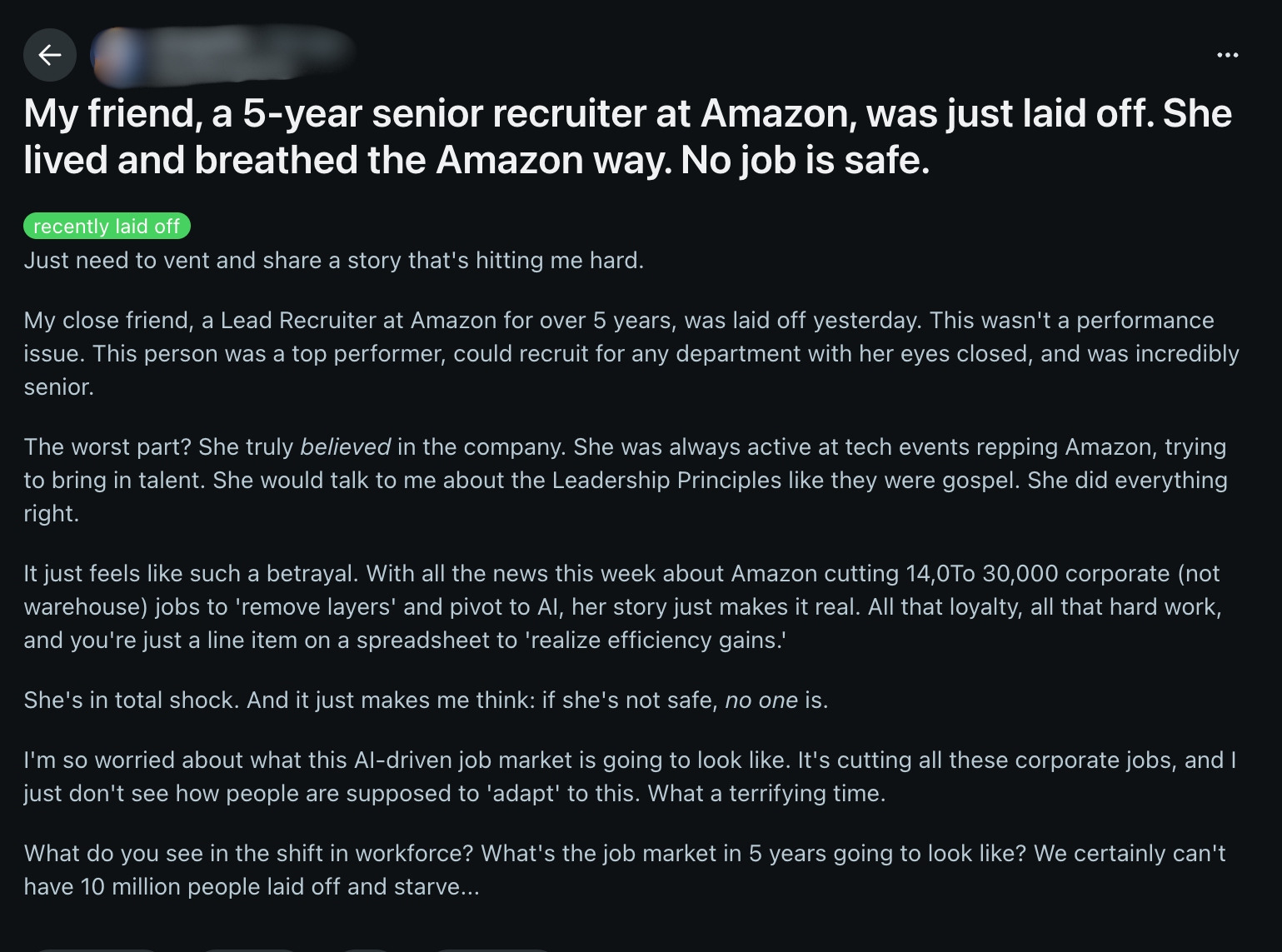This feels like a betrayal: How an Amazon recruiter’s layoff story echoes the pain of mill
November 9, 2025
From California to Bengaluru, corporate corridors are echoing with the same uneasy phrase: “workforce restructuring.” Over the past year, global giants includingAmazon, Google, Meta,IBM, and Accenture have announced sweeping layoffs as they “streamline operations” and “pivot to AI.”Thousands of white-collar workers in tech alone have lost their jobs since January 2025, many of them in recruiting, marketing, and mid-management roles once considered secure.

Against this backdrop, one viral Reddit post struck a chord worldwide. It told the story of a senior Amazon recruiter, a five-year veteran, loyal advocate, and high performer, who was suddenly laid off. She had lived by Amazon’s leadership principles, promoted the brand at every tech event, and believed in the company’s mission. Yet, like thousands of others, she became a casualty of “efficiency.” Her story has become a symbol of the new corporate reality: if she’s not safe, who is?
Tech’s efficiency drive comes for its own
Amazon recently announced plans to cut roughly 14,000 corporate roles, part of a broader restructuring aimed at “removing layers” and redirecting resources toward artificial intelligence. CEOAndy Jassystated in an internal memo that generative AI and automation will fundamentally reshape how the company operates, requiring “fewer people doing some of the jobs that are being done today” and “more people doing other types of work.”This mirrors a larger trend across the tech world. In 2025 alone, layoffs across some of the biggest global firms have been in the headlines. Google, Meta, IBM, and Accenture have all trimmed corporate headcount, particularly in HR, recruiting, tech, sales, and administrative roles: functions that AI can now perform faster and at scale.In Amazon’s case, the cuts hit hardest in human resources, operations, and internal recruiting — departments once viewed as core to its “people-first” model.For many employees, the message was clear: efficiency now outweighs loyalty.
The human cost of efficiency
The emotional weight of the Reddit post comes from its raw honesty. The author describes their friend, a Lead Recruiter at Amazon, as someone who “lived and breathed the Amazon way.” She could “recruit for any department with her eyes closed,” they wrote, adding that she “believed in the company like it was gospel.”Then, without warning, she was laid off. No performance issue.No misconduct. Just a restructuring email.“All that loyalty, all that hard work, and you’re just a line item on a spreadsheet to ‘realize efficiency gains,’” the post reads.The story resonated because it captures what many workers feel but rarely voice: the betrayal of faith in corporate culture. For years, employees were told to “act like owners,” to “believe in the mission,” to align with leadership principles.But as AI reshapes business structures, even the most devoted insiders find themselves expendable.The irony is sharp — the same recruiters and HR professionals who once hired AI engineers are now being replaced by the systems those engineers helped build.
The new reality: Loyalty vs. logic
Across big tech, layoffs are no longer about poor performance or sluggish markets. They are strategic, algorithmic, and efficiency-driven. In 2025, the conversation has shifted from “who’s underperforming” to “what can AI do faster and cheaper.”As companies flatten hierarchies and embed generative AI into everyday workflows, middle management and administrative roles are under unprecedented pressure. Managers who once oversaw human teams are now managing digital agents and automation pipelines. Recruiters are competing with AI tools that can source, screen, and shortlist candidates in minutes.For many professionals, it’s not just a job loss — it’s an identity crisis.Belief in corporate mission statements has given way to survival instincts in an economy where no one feels indispensable.
The job market in five years
So what does the next half-decade look like for white-collar work? Current projections suggest a deep and lasting transformation.This transformation isn’t purely technological; it’s cultural. The concept of “career security” is giving way to “career adaptability.”
What students and professionals should learn from this
For educators and early-career professionals, the takeaway is urgent but clear: the rules of work are changing faster than curricula.Educational institutions, too, will need to pivot, moving from training for fixed jobs to training for flexible futures.
The fragile future of work
The story of the Amazon recruiter is not an anomaly. Rather, it’s a mirror reflecting the age of AI restructuring. Her dedication, alignment, and belief in her company’s mission were once her greatest strengths. Now, they are reminders that the social contract between corporations and employees has been rewritten.The future of work will still involve humans — but the humans who thrive will be those who learn, adapt, and evolve alongside the machines.Her story, shared on a quiet Reddit forum, has become a warning echoed across continents: in the AI era, no job is truly safe — but no future is fixed either.
Ready to navigate global policies? Secure your overseas future. Get expert guidance now!
Search
RECENT PRESS RELEASES
Related Post




